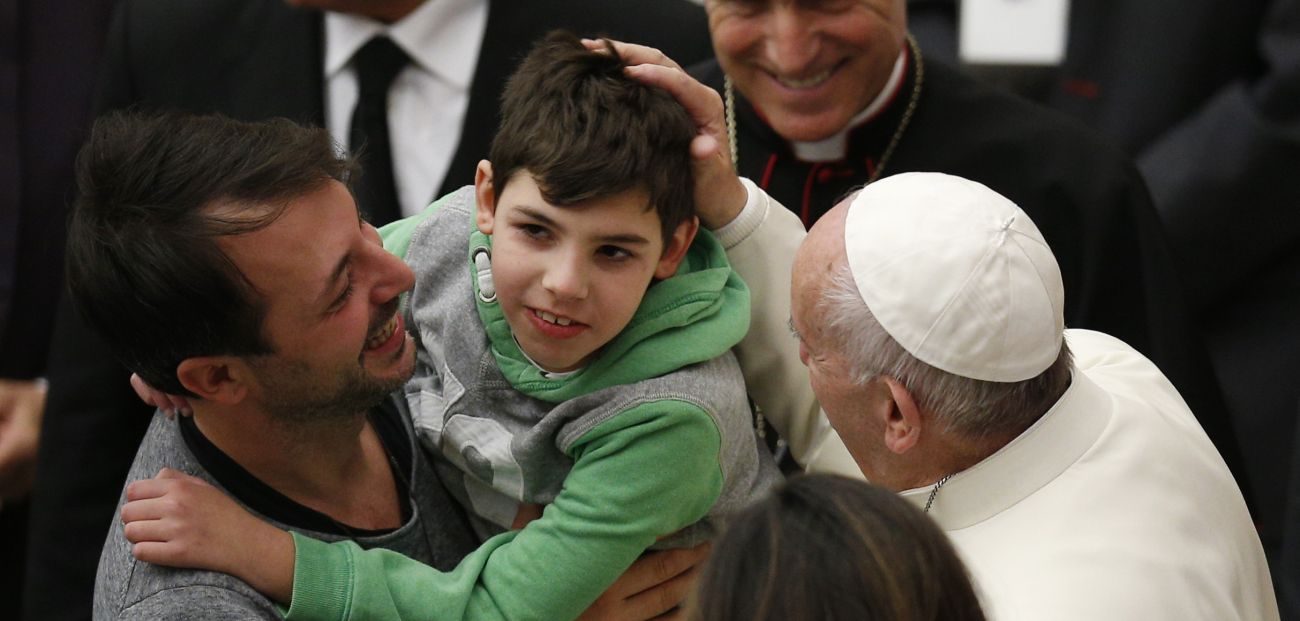VATICAN CITY (CNS) — The Year of Mercy and its series of papal reflections may be over, but compassion and acts of mercy must continue and become a part of everyone’s daily lives, Pope Francis said.
“Let us commit ourselves to praying for each other so that the corporal and spiritual works of mercy increasingly become our way of life,” he said Nov. 30 during his general audience in the Vatican’s Paul VI hall.
(See a related video.)
Because the day also marked the feast of St. Andrew, brother of St. Peter and founder of the church in Constantinople, Pope Francis gave special greetings to his “dear brother,” Ecumenical Patriarch Bartholomew of Constantinople.
[hotblock]
Pope Francis, the bishop of Rome and successor of Peter, said he was sending “a big embrace” to the patriarch and “this cousin church.”
The Vatican released a letter from the pope to the patriarch, which praised the way Catholics and Orthodox have begun “to recognize one another as brothers and sisters and to value each other’s gifts, and together have proclaimed the Gospel, served humanity and the cause of peace, promoted the dignity of the human being and the inestimable value of the family, and cared for those most in need, as well as creation, our common home.”
In his main audience talk, the pope ended his yearlong series of talks on mercy with a reflection on the corporal work of burying the dead and the spiritual works of praying for the living and dead.
Catholics particularly remember the faithful departed during the month of November, he said. Praying for those who have died “is a sign of recognition for the witness they have left us and the good they have done. It is a giving thanks to the Lord for having given them to us and for their love and friendship.”
By entrusting their souls to God’s mercy, “we pray with Christian hope that they are with him in heaven,” he said.
While for many burying the dead is an expected, straightforward ritual, there are some parts of the world where this may not be a given, such as places experiencing “the scourge of war, with bombings day and night that sow fear and innocent victims,” he said.
“Even today, there are those who risk their life to bury poor victims of war,” he added, thanking those particularly in Syria and the Middle East for their courage in recovering the dead and going to rescue the injured.
Praying for the living, he said, can be done in many ways, such as: blessing one’s children every morning and evening; visiting and praying for the sick; praying silently, “sometimes in tears,” for help during difficult times; even thanking God for the blessings bestowed upon one’s family, friends and co-workers.
The important thing, he said, is to always have one’s heart open to the Holy Spirit, “who knows our deepest desires and hopes,” and can “purify and bring them to fulfillment.”
[hotblock2]
“We always ask that God’s will be done for ourselves and for others, like in the Lord’s Prayer, because his will is definitely the greatest good, the goodness of a father who never abandons us,” he said.
After his main talk, the pope also made an appeal for World AIDS Day Dec. 1, urging “everyone to adopt responsible behavior to prevent the further spread of this disease.”
The Catholic Church promotes sexual abstinence before marriage and monogamy within marriage as the best ways to limit HIV transmission, and holds that condom-distribution campaigns aggravate the problem.
In his appeal, Pope Francis called for prayers for those affected by HIV/AIDS and for renewed efforts in getting adequate testing and therapy to the poorest in the world. He said the United Nations estimates only half of those living with HIV/AIDS have access to lifesaving treatment.
PREVIOUS: Lithuanian archbishop says citizens tense over Russian buildup
NEXT: Pope meets Martin Scorsese after director screens ‘Silence’ for Jesuits




Share this story